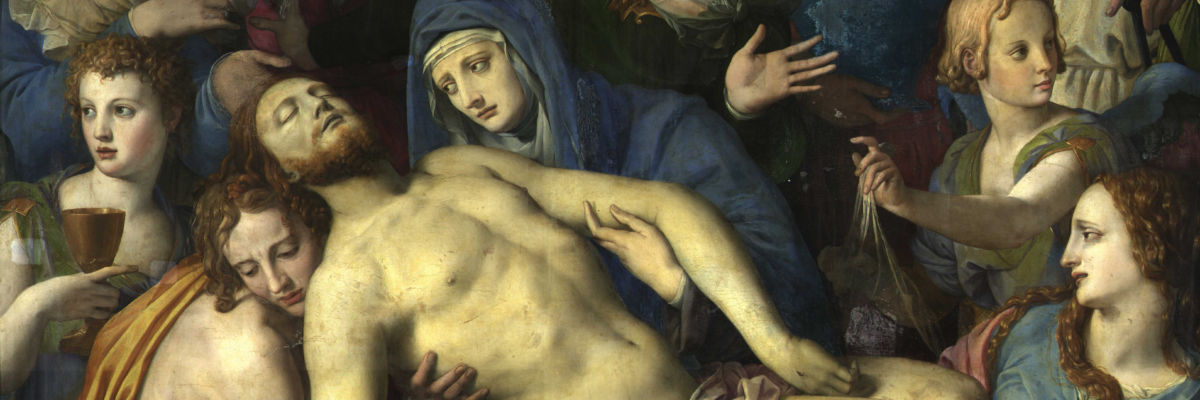
Tim Staples explains the Catholic teaching that Jesus does not die again at every Mass, but rather, every Eucharist is a participation in His death on the cross.
Transcript:
Host: Oh look at this, Karen in Waco, Texas, where Tim just came back from, listening on 98.3 FM. Karen, you are on with Tim Staples on Catholic Answers Live.
Caller: Hi Tim, how are you?
Tim: I’m doing well, were you there at St. Louis just the other night?
Caller: No, no I was not, actually this is my first time hearing this.
Tim: Oh, well, Karen, I got to tell you now, I’ll be coming back to Waco because Fr. John over there told me he’s going to have me back, so when I come back to Waco, Texas I want to meet you, okay?
Caller: Okay, awesome.
Tim: You come and you ask a question after my talk in Waco, and tell me, “I’m Karen, the one who talked to you on the radio.” Go ahead, Karen.
Caller: Okay, I actually was a Catholic, I grew up a Catholic, and I became seriously a Catholic when I became an adult. However, I’m now nondenominational, I’m an Evangelical, and I just, you know, I left the Catholic Church primarily because, you know, I believe that Jesus only died once for our sins. And, you know, with the Eucharist, of course, He dies every time you have Communion.
Tim: All right, Karen, let me jump in here real quick, because you’ve just made a very, very important point. Karen, I want to invite you to come back to the Catholic faith, and this is why: because you left for something the Catholic Church does not teach. The Catholic Church has never taught that we kill Jesus over and over again. Karen, that’s something I used to say Catholics teach, because that’s what my Baptist pastor taught me, and that’s what my Pentecostal friends taught, but when I actually learned what the Catholic Church teaches, no, we believe Jesus Christ died once for all, 2000 years ago on the cross.
In the Eucharist we don’t re-crucify Christ, but we experience, mystically, that one sacrifice of Jesus Christ, communicated to us through the Eucharist. This is why, Karen, 1 Corinthians chapter 15–and by the way, Karen, I’m going to offer you something. If you don’t mind, Karen, I’d like to send you a free gift, and that gift is my CD set called “Living Bread.” It’s four hours of teaching on the Eucharist, and I go through and show you, Biblically, the truth of what the Eucharist is, and Karen, if you want, you can just give your address to our phone screener, and I’m going to send that out to you no charge, and you stay in touch.
Because here’s the bottom line: 1 Corinthians 10:15 says: “The cup which we–” now, this is referring to Communion, all right? We Catholics refer to it as the Eucharist, because when Jesus, you know, gives thanks in the Eucharistic prayer in Matthew 26, and Mark 14, He uses the term “eucharisto,” the verb, and that’s why we call it the Eucharist, that’s a Biblically based term. But St. Paul says, there: “The cup which we bless, is it not a participation in the Blood of Christ? And the bread which we break, is it not a participation in the Body of Christ?” That’s what the Eucharist is; it’s our participating in what Jesus did for us on the cross 2,000 years ago, and that is by divine commandment.
See, Jesus knows, Karen, that you and I, as human beings, need more than just to remember something Jesus did. We need to experience it now. And this is why the Blood of Jesus Christ is not only something that was shed 2000 years ago, but it’s something that we participate in now through the Eucharist, and by walking with the Lord and confessing our sins and so forth, the Blood of Jesus gets applied to our life. And there’s many ways the Blood of Jesus is applied in Catholic and Biblical teaching; but a principal way is through the Eucharist, and that’s what St. Paul taught.
So Karen, again, I emphasize, you left the Catholic Church because of something the Catholic Church doesn’t teach, what do you think of that?
Caller: Well, I think that, you know, I’ve always been told when I was in the Catholic Church that when you get the wafer you could not let a piece of it drop because that was, like, the Body of Christ.
Tim: Yes it is, Karen. Karen, it is, and I’ll jump in real quick here. Yes it is, because Jesus said so. Jesus is the one who said, in Luke 22:18, “This is my body.” Right? “This is,” and as the great St. Cyril of Jerusalem said in the fourth century, Jesus’ word is so powerful, it’s more powerful than nature. When Jesus speaks–and you know this, Karen–God’s Word is quick and powerful and sharper than any two-edged sword, right? When God speaks, what He says, is. When Jesus says, God says, “This is my body,” that’s what it is.
And that’s why St. Paul would say that the Eucharist, Communion, is our participation in the body and blood of the Lord, and that’s why, if you go forward, Karen, to 1 Corinthians 11:27-29, St. Paul will say, “If anyone eats this bread or drinks the cup of the Lord unworthily, he eats and drinks damnation to himself, because he does not discern the body of the Lord.” Check it out, 1 Corinthians 11:27-29.
See, in your Evangelical communities, and Karen, I was raised there, they teach that the Eucharist is just grape juice and crackers. But that’s not what the New Testament teaches. And the reason why we teach people, “Yes, you treat the Eucharist with respect,” is because we’ve been given a tremendous gift to receive Jesus Christ’s body, blood, soul, and divinity, every day if you go to daily Mass, or once a week if you’re a Catholic in good standing with the Church.
Caller: Okay. Well, my mom would be happy that you said all of that.
Tim: Well Karen, let me tell you, please let me let me beg you, let the phone operator here, our call-screener, take down your address and let me send that free CD set to you, and I’ll tell you what I’ll do: I will sign it and I will put my email address on there. I’m going to give you my personal email address. I would like to hear from you, you tell me what’s right or what’s wrong about what you hear on that CD. What do you say?
Caller: I say that’s a great–I would love to do that.
Tim: Well God bless you Karen, the call-screener will take your name, and I really appreciate you being a good sport by asking the question respectfully and listening to the response. God bless you Karen, and thanks for calling.



